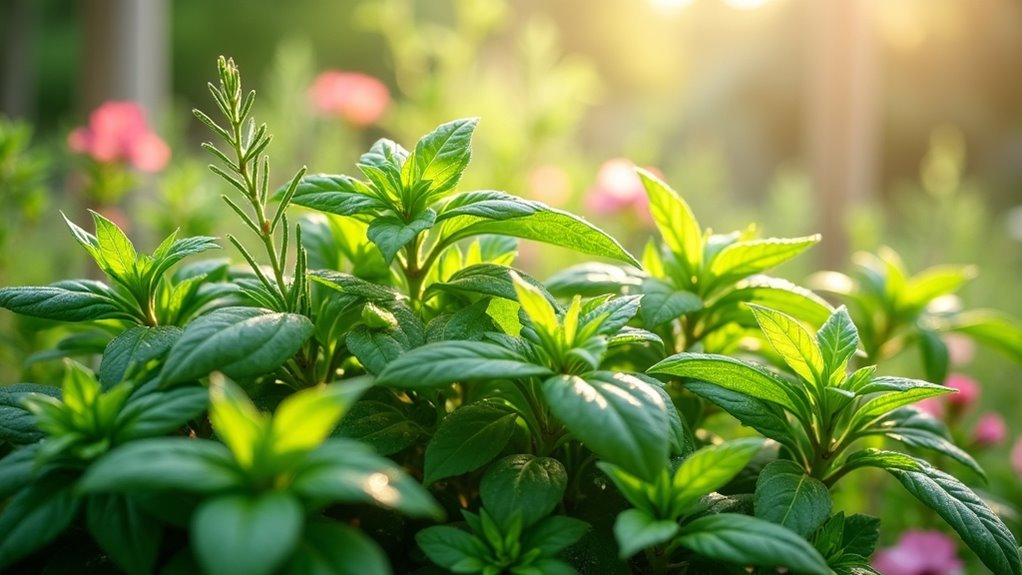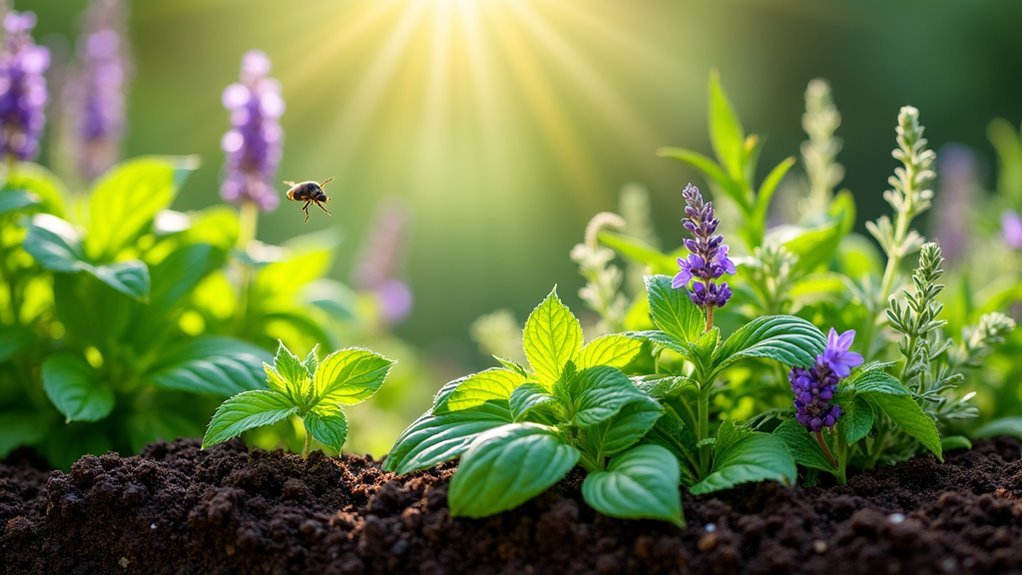Aromatic herbs repel garden pests through powerful essential oils that overwhelm insects’ olfactory receptors, making it difficult for them to locate target plants. Strong scents from herbs like basil, mint, and lavender mask the attractive odors your crops naturally emit. These plants release compounds like menthol, citronellal, and nepetalactone that act as natural deterrents – with catnip being ten times more effective than DEET against mosquitoes. You’ll discover specific companion planting strategies that maximize these protective benefits.
How Strong Scents Mask Plant Odors That Attract Pests

When pests search for their next meal, they rely heavily on scent to guide them to vulnerable plants, but aromatic herbs can effectively disrupt this process.
You’ll find that strong-scented herbs like mint create a natural insect repellent barrier by masking the odors that attract pests to crops like cabbage. These herbs repel unwanted insects by overwhelming their olfactory receptors, making it difficult for them to detect target plants.
This natural pest control method helps keep destructive insects away while working to attract beneficial insects that support garden health. The volatile compounds released by fragrant herbs fundamentally create confusion among pests, preventing them from locating their preferred food sources and reducing infestations.
Natural Chemical Compounds in Herbs That Repel Insects
Beyond simply overwhelming scent receptors, aromatic herbs contain specific chemical compounds that actively repel insects through targeted biological mechanisms.
You’ll find that essential oils in these plants produce potent deterrents against insect pests. Lemongrass releases citronellal, while bay leaves emit eucalyptol—both compounds effectively drive away common garden invaders.
Catnip’s nepetalactone proves remarkably effective at repelling mosquitoes, outperforming synthetic alternatives by ten times.
Marigolds contain pyrethrum, which disrupts insects’ nervous systems as a natural insect deterrent.
Basil and mint produce menthol and other natural chemical compounds that create protective barriers around vulnerable plants.
These aromatic herbs offer dual benefits—you can enjoy their culinary uses while maintaining pest-free gardens through their scientifically-proven insect-repelling properties.
Top Aromatic Herbs for Effective Garden Pest Control

Selecting the right aromatic herbs transforms your garden into a natural fortress against unwanted pests.
Basil and mint release powerful scents that effectively repel mosquitoes, flies, and aphids, making them excellent natural repellents for any garden space.
Lavender works double duty by deterring mosquitoes and moths while attracting beneficial pollinators to enhance your garden’s ecosystem.
You’ll find garlic particularly useful against aphids and cabbage loopers, offering both culinary value and pest control benefits.
Catnip outperforms DEET in mosquito repelling effectiveness, making it an exceptional natural choice.
Rosemary and sage help control cabbage moths and beetles, ensuring your plants stay healthy without chemical interventions.
These aromatic herbs create extensive protection while maintaining your garden’s natural balance.
Companion Planting Strategies With Pest-Repelling Herbs
Strategic companion planting with pest-repelling herbs creates powerful natural defense systems that protect your crops while maximizing garden space efficiency.
Companion planting transforms your garden into a natural fortress where aromatic herbs work alongside vegetables to create pest-resistant growing systems.
These aromatic herbs enhance biodiversity while providing organic gardening solutions that discourage pests naturally.
Strategic placement of pest-repelling herbs maximizes their effectiveness:
- Plant basil near tomatoes and peppers – This combination helps repel mosquitoes, flies, and thrips while improving flavor profiles of your vegetables.
- Interplant garlic around cabbage family crops – Garlic’s strong compounds deter aphids and cabbage loopers through natural pest control mechanisms.
- Position mint borders around garden beds – Mint targets cabbage moths and ants while creating aromatic barriers that beneficial insects appreciate.
- Scatter marigolds throughout vegetable rows – These flowers attract beneficial insects for pollination while simultaneously repelling harmful pests.
Benefits of Using Aromatic Herbs Over Chemical Pesticides

While companion planting provides immediate spatial benefits, choosing aromatic herbs over chemical pesticides delivers far-reaching advantages that transform your entire garden ecosystem. You’ll discover that natural pest control through aromatic herbs creates sustainable gardening practices that protect beneficial insects while maintaining effective pest management.
| Benefit Category | Aromatic Herbs | Chemical Pesticides |
|---|---|---|
| Environmental Impact | Enhance biodiversity, attract pollinators | Harm beneficial insects, damage soil |
| Pest Management | Effective at repelling without resistance | Create pest resistance over time |
| Safety | Natural pest repellent, safe for ecosystem | Toxic chemicals, health risks |
| Sustainability | Organic pest control, lower carbon footprint | High production emissions, synthetic |
When you use herbs that repel mosquitoes and aphids, you’re choosing long-term garden health over quick fixes that ultimately compromise your growing environment.
Frequently Asked Questions
Do Herbs Repel Pests?
You’ll find herbs do repel pests effectively. They contain volatile compounds that emit strong scents, disrupting insects’ sensory perception and making it difficult for pests to locate their food sources in your garden.
Why Does Rosemary Repel Bugs?
Rosemary’s camphor and rosmarinic acid create strong scents that disrupt insects’ sensory receptors. You’ll find these aromatic compounds confuse bugs, making it harder for them to locate food sources and mates effectively.
Why Does Garlic Repel Pests?
When you crush garlic cloves, they release allicin, a sulfur compound that creates a pungent odor. This strong scent repels pests like aphids and beetles while masking your plants’ natural aromas.
What Herbs Are Good for Bug Repellent?
You’ll find basil, lavender, mint, catnip, citronella grass, and marigolds work exceptionally well as natural bug repellents. They’re particularly effective against mosquitoes, flies, and aphids due to their strong-scented volatile oils.
In Summary
You’ll find aromatic herbs offer a natural, effective solution for garden pest control. By masking attractive plant odors and releasing pest-repelling compounds, they’ll protect your garden without harmful chemicals. You can strategically plant basil, lavender, rosemary, and other fragrant herbs throughout your garden beds. This companion planting approach won’t just deter unwanted insects—it’ll also provide you with fresh herbs for cooking while maintaining a healthy, eco-friendly garden ecosystem.





Leave a Reply